Tuesday, May 30, 2006:
Peggy Lee -- I'm a Woman
While we're listening to Jim Kweskin (see The Wiyos, below), be sure to check out Maria Muldaur's great first recording of I'm a Woman. I definitely prefer the funkiness of this song to the overproduced version she later cut as a solo artist. (Nice washboard here, too, Tuwa.)
When she says "Come on, Mel" to the harmonica player, she's talking to Mel Lyman, the center of one of the more bizarre acid-drenched episodes from the acid-drenched 60s. Lyman was the charismatic leader of a Boston commune called the Lyman Family, which counted Kweskin as one of its members. In 1971, there was a long controversial expose in Rolling Stone that accused the Lyman Family of being a violent authoritarian cult that worshipped Lyman as the reincarnation of Jesus. Mel died in 1978, but the Lyman Family still survives and runs a successful construction business. Kweskin's still a member, I think. The whole affair is exhaustively documented at this site, or you can read the condensed version in Wikipedia.
And here's the original of I'm a Woman by Peggy Lee. If you only know the Maria Muldaur versions, it comes as a real surprise. I had always assumed it was based on an old country song, but this is a pop song with a hint of R&B styling (similar to but not as good as Peggy's hit version of Fever). My better half says she makes the song sound sexy, but I still prefer Maria's (original) version. It's the only one where I actually believe what she's saying -- especially when she sings, "I can make a dress out of a feedbag and make a man out of you." I'm still waiting, Maria.
[Jug Band Music]
[The Best of Miss Peggy Lee]
The Roots Canal: I'm a Woman
Jim Kweskin & The Jug Band (with Maria Muldaur) -- I'm a WomanPeggy Lee -- I'm a Woman
While we're listening to Jim Kweskin (see The Wiyos, below), be sure to check out Maria Muldaur's great first recording of I'm a Woman. I definitely prefer the funkiness of this song to the overproduced version she later cut as a solo artist. (Nice washboard here, too, Tuwa.)
When she says "Come on, Mel" to the harmonica player, she's talking to Mel Lyman, the center of one of the more bizarre acid-drenched episodes from the acid-drenched 60s. Lyman was the charismatic leader of a Boston commune called the Lyman Family, which counted Kweskin as one of its members. In 1971, there was a long controversial expose in Rolling Stone that accused the Lyman Family of being a violent authoritarian cult that worshipped Lyman as the reincarnation of Jesus. Mel died in 1978, but the Lyman Family still survives and runs a successful construction business. Kweskin's still a member, I think. The whole affair is exhaustively documented at this site, or you can read the condensed version in Wikipedia.
And here's the original of I'm a Woman by Peggy Lee. If you only know the Maria Muldaur versions, it comes as a real surprise. I had always assumed it was based on an old country song, but this is a pop song with a hint of R&B styling (similar to but not as good as Peggy's hit version of Fever). My better half says she makes the song sound sexy, but I still prefer Maria's (original) version. It's the only one where I actually believe what she's saying -- especially when she sings, "I can make a dress out of a feedbag and make a man out of you." I'm still waiting, Maria.
[Jug Band Music]
[The Best of Miss Peggy Lee]
Monday, May 29, 2006:
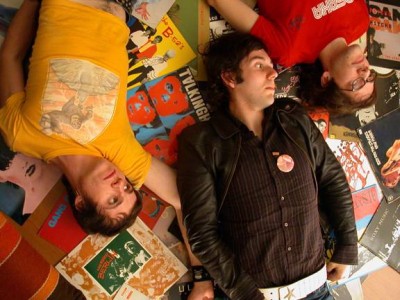
X-Wife -- Ping Pong
I was sent this track in mid-March and, just to prove that I don't always know a good thing when it comes around, I didn't start listening to it much until a couple of weeks ago.
On their MySpace page, they self-identify as "post punk electronic rock power trio," which is a good start to a description that continues on into "funky neurosis crossed with retro-technolust, catchy verses, and clubhopping joie de vivre."
*Bandwidth is tapped at dot-mac, which decided to start sucking once I signed up to it (they switched from unmetered bandwidth to 20GB/month, which isn't nearly enough even for this site). So this track is at box.net and the earlier tracks don't work at the moment.
[X-Wife's site]
[X-Wife @ Myspace]
...
As you may know, reggae/rocksteady legend Desmond Dekker died on May 25. Plenty of tracks floating around the blogosphere, for instance "007 Shantytown" at Retrobabe, "Pretty Africa" at Music for Robots, "Bongo Gal" and "Pickney Girl" at Number One Songs in Heaven, and "Unity" and "Intensified '68" at Can't Stop Won't Stop.
...
Neil Gaiman tries to call his daughter, and MCI gives some unusual customer service.
...
An awesome post pointing out "Beatles moments."
...
And don't miss two AskMe classics, "I just started dating this really awesome girl, and we spend the night together often, and I want to know how long I have to wait before I can fart in bed" and "What does it mean when a man shows an anal sex video on the first date?" I love the range of human conduct shown on that site....
X-Wife -- Ping Pong

X-Wife -- Ping Pong
I was sent this track in mid-March and, just to prove that I don't always know a good thing when it comes around, I didn't start listening to it much until a couple of weeks ago.
On their MySpace page, they self-identify as "post punk electronic rock power trio," which is a good start to a description that continues on into "funky neurosis crossed with retro-technolust, catchy verses, and clubhopping joie de vivre."
*Bandwidth is tapped at dot-mac, which decided to start sucking once I signed up to it (they switched from unmetered bandwidth to 20GB/month, which isn't nearly enough even for this site). So this track is at box.net and the earlier tracks don't work at the moment.
[X-Wife's site]
[X-Wife @ Myspace]
...
As you may know, reggae/rocksteady legend Desmond Dekker died on May 25. Plenty of tracks floating around the blogosphere, for instance "007 Shantytown" at Retrobabe, "Pretty Africa" at Music for Robots, "Bongo Gal" and "Pickney Girl" at Number One Songs in Heaven, and "Unity" and "Intensified '68" at Can't Stop Won't Stop.
...
Neil Gaiman tries to call his daughter, and MCI gives some unusual customer service.
...
An awesome post pointing out "Beatles moments."
...
And don't miss two AskMe classics, "I just started dating this really awesome girl, and we spend the night together often, and I want to know how long I have to wait before I can fart in bed" and "What does it mean when a man shows an anal sex video on the first date?" I love the range of human conduct shown on that site....
Labels: electronica, pop
Thursday, May 25, 2006:
I saw The Wiyos again last weekend. They're sort of a goodtime retro-roots trio that describes itself as "vaudevillian ragtime blues, hillbilly swing and old time country." There's a Gumby contortionist on stand-up bass; a Jolson-style lead singer who never speaks (he holds up signs instead) but carries a valise-full of harmonicas and kazoos and plays a mean washboard studded with various horns, whistles and bells; and a deadpan folk guitarist who used to play with my old friend Woody Mann and seems out-of-place because he acts so normal.
Anyway, they're fun. Enjoy this song from their new album.
Bonus track: This song has an interesting history of its own. It was written by jazzman Johnny Dunn back in the 1920s, became a staple of Western Swing and goodtime bands, and was brought back to life in the folk revival of the 1960s. I've always liked Jim Kweskin's version from his seminal 1965 album, Jug Band Music:
Jim Kweskin & The Jug Band -- The Vamp of New Orleans (Sadie Green).
[Hat Trick]
The Roots Canal: The Wiyos
The Wiyos -- Sadie Green (Vamp of New Orleans)I saw The Wiyos again last weekend. They're sort of a goodtime retro-roots trio that describes itself as "vaudevillian ragtime blues, hillbilly swing and old time country." There's a Gumby contortionist on stand-up bass; a Jolson-style lead singer who never speaks (he holds up signs instead) but carries a valise-full of harmonicas and kazoos and plays a mean washboard studded with various horns, whistles and bells; and a deadpan folk guitarist who used to play with my old friend Woody Mann and seems out-of-place because he acts so normal.
Anyway, they're fun. Enjoy this song from their new album.
Bonus track: This song has an interesting history of its own. It was written by jazzman Johnny Dunn back in the 1920s, became a staple of Western Swing and goodtime bands, and was brought back to life in the folk revival of the 1960s. I've always liked Jim Kweskin's version from his seminal 1965 album, Jug Band Music:
Jim Kweskin & The Jug Band -- The Vamp of New Orleans (Sadie Green).
[Hat Trick]
Tuesday, May 23, 2006:
This is from a disc that got a fairly bad writeup on allmusic; their second disc got a much better review (and I think the second disc probably is more solid all-around).
[Cyne's official site]
Popcanon -- Ballyhoo
Say, what do we really use from science?
"E=mc2"
Are reason and faith an unholy alliance?
"I don't know and I don't care."
A lot of my family has a sincere love for kitsch--Precious Moments bells, cow-spotted milk jugs, etc.--and I've only just now realized that I probably do too. This is a very nerdy, goofy song.
[Popcanon's official site]
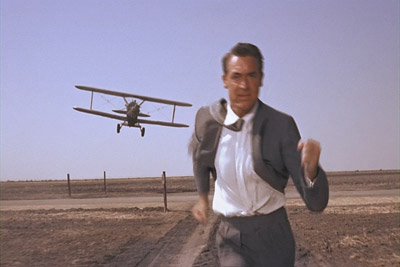
Whoreculture -- Crop Duster
I like this song; I think it's a lot of fun. Whoreculture's Join strikes me as more rock-oriented; Boondocked is slower and heavier but equally impressive. I've been unable to find anything more by the band, as they broke up years ago. They don't seem to have a site up.
Lars Din -- Ness City Bank Job (Yer So Sweet)
[Lars Din's (older) site]
[Lars Din's newer site]: lyrics, tour dates, songs.
The lyrics are in five sections: a series of vignettes, some choice details, activity in the ellipses. Who are these four people? Or are they two? And that valentine--why for her mother?
This song is not the best-sung song you'll hear. Lars is nearing the end of a concert and his voice is tired. He aims high and misses, aims high and misses, aims high and misses ... aims high and nails it, nails it when it counts the most.
It's a quiet number, exhausted--on the ropes, maybe about to give up. And then, out of nowhere: left hook, stars, roofbeams on a tilt. Mat.
the mix part three
Cyne -- Nothing's SacredMike Williams -- The second hip hop track is loads better. The vocal sample is great, and it has (nu-)soul. A keeper.
Jerimee Bloemeke -- The production sounds like something Kanye would do. I'm not a big fan of rap, but this is not bad. I can't really get into it, though, because it has no chorus.
This is from a disc that got a fairly bad writeup on allmusic; their second disc got a much better review (and I think the second disc probably is more solid all-around).
[Cyne's official site]
Popcanon -- Ballyhoo
Mike Williams -- I think this song is about religion and science. It finds in favour of the latter, which is fine by me, but there are better forums for such a discussion than a song with humorous instrumentation. It sounds like a number from The Producers musical.
Jerimee Bloemeke -- No, no, no. The back-up singers said it so well.
Say, what do we really use from science?
"E=mc2"
Are reason and faith an unholy alliance?
"I don't know and I don't care."
A lot of my family has a sincere love for kitsch--Precious Moments bells, cow-spotted milk jugs, etc.--and I've only just now realized that I probably do too. This is a very nerdy, goofy song.
[Popcanon's official site]

Whoreculture -- Crop Duster
Mike Williams -- Ridiculously entertaining and very Southern rock. This song takes an idea (what it's like to be a cropduster) and solves it. The result is a McSweeney's article set to music by George Thorogood and the Destroyers. If joycore was people having fun for a reason (rather than no reason) it would sound like this.
Footnote: Whoreculture is probably one of the top five band names ever.
Jerimee Bloemeke -- With a name like Whoreculture, how can anyone take you seriously? The music doesn't help either....
I like this song; I think it's a lot of fun. Whoreculture's Join strikes me as more rock-oriented; Boondocked is slower and heavier but equally impressive. I've been unable to find anything more by the band, as they broke up years ago. They don't seem to have a site up.
Lars Din -- Ness City Bank Job (Yer So Sweet)
Mike Williams -- This is singer-songwriter storytelling that manages to be poetic and avoid the literal hectoring that can easily befall a song about Events. The Band were good at this. Bruce Springsteen is good at this when he isn't too busy being awful at this. Lars Din is good at this, and I want to hear more of his stuff.
This is my favourite track on the CD.
Jerimee Bloemeke -- This is soothing. The singer is like an unironic Morrissey at times. And he plays nice acoustic guitar.
[Lars Din's (older) site]
[Lars Din's newer site]: lyrics, tour dates, songs.
The lyrics are in five sections: a series of vignettes, some choice details, activity in the ellipses. Who are these four people? Or are they two? And that valentine--why for her mother?
This song is not the best-sung song you'll hear. Lars is nearing the end of a concert and his voice is tired. He aims high and misses, aims high and misses, aims high and misses ... aims high and nails it, nails it when it counts the most.
It's a quiet number, exhausted--on the ropes, maybe about to give up. And then, out of nowhere: left hook, stars, roofbeams on a tilt. Mat.
Monday, May 22, 2006:
Mike Williams lives in Oxford, UK, and runs Dreamboat Records, home to The Rollercoaster Project (which you might have caught on Said the Gramophone some time back).
Jerimee Bloemeke is not a black-belt ninja; his skills are so advanced the universe is afraid to let his jacket flap open. He can kill birds, small mammals, and frail humans with the briefest of glances; healthy humans sometimes take a second and a half. He also reviews music, as at Kill All Artists and as below. For that, and for not giving me The Stare of Doom, I thank him.
Returning to the mix:
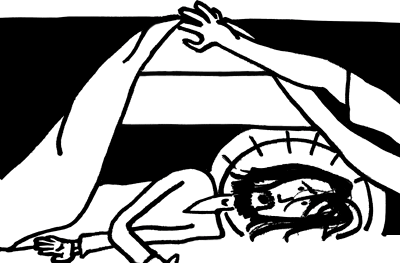
Morningbell -- I Found Jesus (Hiding Underneath the Bed)
Is this prog-pop? Really? I'd always associated it with 1970s wankery: ten-minute song codas, flutes and acoustic guitar and songs about the Lord of the Rings, album covers showing vibrantly-colored woodlands and "mysterious" hooded figures and whatnot.
[Morningbell's official site]
[Morningbell Myspace account]
Maxwell Edison -- Cheap Airfare
I did like this song when I first put it on the mix. I still liked it after I sent the mix out. Sometime after that I began not to like it, and then I began to despise it. Your mileage may vary.
[Maxwell Edison's official site]
[Maxwell Edison's Myspace account]
Towers of Hanoi -- Torn Jeans
Not a happy track, no, but I like it.
[Towers of Hanoi's official site]
[Towers of Hanoi's Myspace account]
Against Me! -- I Still Love You Julie
These guys are pissed off. I saw one of them several years ago, strumming an acoustic guitar on UF campus and singing/screaming himself hoarse about worker exploitation. I don't know anyone who can rock an acoustic guitar that hard. Maybe Rev. Frost.
[Against Me!'s site]
Big Oil -- Pot of Gold
This is another one I used to like (I have a knack for listening to songs without listening to the lyrics, and Mike is right; the lyrics are god-awful. To think I used to mock that Lenny Kravitz song about the butterfly up in the sky....)
[Big Oil's official site]
MC Intellekt -- More Than Meets the Ear
Intellekt gives a lot of concerts in town, and he's got fairly literate stream-of-conscious rhymes with a sense of humor. But that chorus--I'm puzzled too; it's like watching a David Lynch film. I don't get it, and I'm more than a bit disturbed by it, but I can't look away.
Also, "meta-wank" is my new favorite musical descriptor.
[MC Intellekt's official site]
This was the worst part of the mix, I think--lots of tracks here I wouldn't pick again. The next (and last) part is better.
the mix part two
In my hurry to get the last post up, I completely forgot to introduce Mike and Jerimee (sorry for that, fellas! and thanks for your patience).Mike Williams lives in Oxford, UK, and runs Dreamboat Records, home to The Rollercoaster Project (which you might have caught on Said the Gramophone some time back).
Jerimee Bloemeke is not a black-belt ninja; his skills are so advanced the universe is afraid to let his jacket flap open. He can kill birds, small mammals, and frail humans with the briefest of glances; healthy humans sometimes take a second and a half. He also reviews music, as at Kill All Artists and as below. For that, and for not giving me The Stare of Doom, I thank him.
Returning to the mix:

Morningbell -- I Found Jesus (Hiding Underneath the Bed)
Mike Williams -- A promising title, but the overwrought arrangement and silly instrumentation (are those oboes!?) is distracting. I'm probably not the right audience for psychedelic prog-pop though.
Jerimee Bloemeke -- When I first saw this song on the mix I knew I would love it. For some reason, I like any song about Jesus, especially ones that do not take the whole idea of a martyr who dies on a cross too seriously, evidenced in this song’s title, where Jesus hides underneath a bed. And also by this amazing lyric, out of Jesus's mouth: If you’re tryin' to impress me, don't bother/ You think you're so great, well, I'd like to see you walk on water/ I invented that shit. The whole song is about a Jesus that is hiding from all his troubles and is tired of having to listen to the troubles of others.
The song starts with acoustic guitar strumming, and a wailing, double-tracked vocal. The instrumentation in this song is all over the place: trumpets, banjo, synthesizer, saxophone, piano, etc. This is great stuff. And I can't wait to get more of it from this band.
Is this prog-pop? Really? I'd always associated it with 1970s wankery: ten-minute song codas, flutes and acoustic guitar and songs about the Lord of the Rings, album covers showing vibrantly-colored woodlands and "mysterious" hooded figures and whatnot.
[Morningbell's official site]
[Morningbell Myspace account]
Maxwell Edison -- Cheap Airfare
Mike Williams -- Eek. If you're my age and British, you’ll have been subjected to the Charlatans. This track reminds me of them, but with the Hammond organ replaced by a Casio keyboard. These guys are session musicians and this is for a car advert, right?
iTunes tells me I've listened every track on this CD at least a dozen times, except this one, which I've got through twice. Awful.
Jerimee Bloemeke -- This track starts out with a quickened Radiohead piano beat, with a singer that sounds like Paul Rodgers. The piano is definitely the centerpiece of this band - their website says it all: "maxwell edison - the best gainesville piano rock." I can't find fault in that. And they follow the Radiohead comparison with some Johnny Greenwood-esque guitar soloing at 3:17.
I did like this song when I first put it on the mix. I still liked it after I sent the mix out. Sometime after that I began not to like it, and then I began to despise it. Your mileage may vary.
[Maxwell Edison's official site]
[Maxwell Edison's Myspace account]
Towers of Hanoi -- Torn Jeans
Mike Williams -- At first I thought this was ludicrous epic rock that sounds like a sincere version of the Darkness. Then I realised it sounds like an unhappy White Stripes. Not my cup of tea at all.
Jerimee Bloemeke -- The singer is a cross between P.J. Harvey, Alanis Morissette, and Signe Anderson. And the band is a cross between Death From Above 1979 and a less progressive Mars Volta.
Not a happy track, no, but I like it.
[Towers of Hanoi's official site]
[Towers of Hanoi's Myspace account]
Against Me! -- I Still Love You Julie
Mike Williams -- Post-Pistols punk has never really meant much in the UK. Sure, it has a scene, which is presumably vibrant, but that scene is relatively isolated. And sure, people profess to liking Minor Threat and Black Flag, but I'm not convinced anyone except actual punks actually do. For myself, my only knowledge of punk comes from a regrettable phase of playing Tony Hawk’s Pro Skater.
That notwithstanding, I love this song. Against Me! are apparently a punk band with alt.country, folk and blues influences. I just hear a band a punk band having a good time. This track is now on heavy rotation.
Jerimee Bloemeke -- Ah! The snare drum ruins this song - it just pops way too loudly and it takes away from everything else. Otherwise, the band is reminiscent of Wolf Parade, but with more yelling.
These guys are pissed off. I saw one of them several years ago, strumming an acoustic guitar on UF campus and singing/screaming himself hoarse about worker exploitation. I don't know anyone who can rock an acoustic guitar that hard. Maybe Rev. Frost.
[Against Me!'s site]
Big Oil -- Pot of Gold
Mike Williams -- This alt.rock dirge threatens to be interesting, but then the lyrics start. "Come on over here and let me hold you near, let me kiss you all over your face / It's been so long since you've been so near, this is such a lovely place." Jesus wept. It's impossible to take this song seriously after that. Maybe that's what Big Oil wanted.
Jerimee Bloemeke -- The singer's voice ruins it for me: sounds like someone I heard on the radio in the mid-'90s.
This is another one I used to like (I have a knack for listening to songs without listening to the lyrics, and Mike is right; the lyrics are god-awful. To think I used to mock that Lenny Kravitz song about the butterfly up in the sky....)
[Big Oil's official site]
MC Intellekt -- More Than Meets the Ear
Mike Williams -- The first of the two hip hop tracks tracks on the CD doesn't do much for me. If you use strings you risk sounding like either Puff Daddy or a horrorcore act. The whiny patois which starts around 1:30 is difficult on the ear. They also make the mistake of talking about themselves and their abilities. I've never understood the popularity of meta-wank in hip hop.
Maybe I'm just out of the hip hop loop. I used to listen to a lot of hip hop. I remember vividly the innocent joy of ejecting a finished Jim O'Rourke CD and replacing it with Dr Octagon's Dr Octagonecologyst. But I am an idiot and a terrible person, so I followed fashions towards beardy alt.country to the exclusion of a lot of other genres, not least hip hop. It’s only recently that I've begun to rehabilitate myself.
Jerimee Bloemeke -- The production and beat on this song is great, but the rapper reminds me of Eminem. And dare I say: Ludacris. ...shudder.... And that chorus? Why?
Intellekt gives a lot of concerts in town, and he's got fairly literate stream-of-conscious rhymes with a sense of humor. But that chorus--I'm puzzled too; it's like watching a David Lynch film. I don't get it, and I'm more than a bit disturbed by it, but I can't look away.
Also, "meta-wank" is my new favorite musical descriptor.
[MC Intellekt's official site]
This was the worst part of the mix, I think--lots of tracks here I wouldn't pick again. The next (and last) part is better.
Labels: alt country, hip-hop, indie, punk, rock
Friday, May 19, 2006:
One of the all-time great songs. The ultimate one-hit wonder of the early R&B era. Think Louie, Louie. Dirty Water. But with class. Lots and lots and lots of class.
Calvin Boze was a Louis Jordan wannabe of the late 40s/early 50s who somehow put it all together for one near-perfect song. Only near-perfect, because of the really, really silly falsetto refrain of "I surrender! I surrender!" that makes you laugh out loud with incredulity when you hear it for the first time. Then you listen over and over again, because you love the rest of the song so much and you almost convince yourself it's not actually stupid but really kind of cool and fits in the context of the times and you write it off to the esthetics of another era when people weren't as, well, sophisticated as they are now so they might have thought it was cool then, too. But no, you finally realize it must have sounded just as stupid then as it does now, and you're just going to have to overlook it because the rest of the song is perhaps the greatest single exemplar of that jumpin' moment when jazz met blues met boogie-woogie met gospel and they all had a bastard daughter who grew up to be rock'n'roll. Like that famous photo of the sailor kissing a girl in Times Square to celebrate the end of World War II. A fading snapshot of ephemera.
Calvin Boze was an unlikely conduit for such a magical moment. He was a journeyman trumpeter from Houston (his high school band included Illinois and Russell Jacquet and Arnett Cobb, and his college band included Charles Brown), who was part of the LA scene that produced so much great R&B. He recorded a few songs under his own name in 1945, but really flowered in a three-year period from 1949-1952. Safronia B was his only big hit, in 1950, although he had a few other memorable songs. He did a version of Lawdy Miss Clawdy a year before Lloyd Price, and also a great song called Looped in 1952 that immediately spawned several covers. And that was it. He was pretty much never heard from again. Safronia B was re-released a few years later but was already too "old-fashioned" for the teenagers who had taken over rock'n'roll.
[The Complete Recordings, 1945 - 1952]
The Roots Canal: I Surrender! I Surrender!
Calvin Boze -- Safronia BOne of the all-time great songs. The ultimate one-hit wonder of the early R&B era. Think Louie, Louie. Dirty Water. But with class. Lots and lots and lots of class.
Calvin Boze was a Louis Jordan wannabe of the late 40s/early 50s who somehow put it all together for one near-perfect song. Only near-perfect, because of the really, really silly falsetto refrain of "I surrender! I surrender!" that makes you laugh out loud with incredulity when you hear it for the first time. Then you listen over and over again, because you love the rest of the song so much and you almost convince yourself it's not actually stupid but really kind of cool and fits in the context of the times and you write it off to the esthetics of another era when people weren't as, well, sophisticated as they are now so they might have thought it was cool then, too. But no, you finally realize it must have sounded just as stupid then as it does now, and you're just going to have to overlook it because the rest of the song is perhaps the greatest single exemplar of that jumpin' moment when jazz met blues met boogie-woogie met gospel and they all had a bastard daughter who grew up to be rock'n'roll. Like that famous photo of the sailor kissing a girl in Times Square to celebrate the end of World War II. A fading snapshot of ephemera.
Calvin Boze was an unlikely conduit for such a magical moment. He was a journeyman trumpeter from Houston (his high school band included Illinois and Russell Jacquet and Arnett Cobb, and his college band included Charles Brown), who was part of the LA scene that produced so much great R&B. He recorded a few songs under his own name in 1945, but really flowered in a three-year period from 1949-1952. Safronia B was his only big hit, in 1950, although he had a few other memorable songs. He did a version of Lawdy Miss Clawdy a year before Lloyd Price, and also a great song called Looped in 1952 that immediately spawned several covers. And that was it. He was pretty much never heard from again. Safronia B was re-released a few years later but was already too "old-fashioned" for the teenagers who had taken over rock'n'roll.
[The Complete Recordings, 1945 - 1952]
Tuesday, May 16, 2006:
Originally I liked all 14 tracks; in the time since it has dropped to 10. By which I mean, I made some bad choices. Feel free to laugh at them in the comments. No, seriously.
Thanks to Mike and Jerimee for their patience.
Whitey Markle -- Proletarian Football Blues
Picture Mark Twain in a bluegrass band with Marxist tendencies. This is one of Whitey Markle's slightly less whimsical numbers. Other standouts include "Cracker Stomp" and "Thinking About You," and "The Cracker Stomp."
The band broke up years ago; there's no official website. Here's a brief writeup of the CD this track came from, though.
Pig Iron -- Seminole Blues
Mike is right about this being pre-R&B blues. This is a song originally by Tampa Red; "Seminole" is the train. Pig Iron doesn't have a site, or at least not one credited in the CD and easily found through search engines.
The Sultanas -- Radio Song
[The Sultanas' site]
Hula -- Taking Pictures
Most of Hula's tracks on the disc are not like this one; they tend to come across much more like Low: subdued, dreamy, spare, maybe a bit bleak. This one, though.... I snuck it onto the U.N. agenda and the vote came back unanimous: it's too short.
[Hula's site]
the mix part one
About that mix CD I made last year: I sent out a half-dozen copies; I got two reviews (a 50% and a 33%, if this were being graded); one person wrote back saying he liked it but didn't want to review it; one wrote back saying he didn't like it and didn't want to review it; and one review never arrived.Originally I liked all 14 tracks; in the time since it has dropped to 10. By which I mean, I made some bad choices. Feel free to laugh at them in the comments. No, seriously.
Thanks to Mike and Jerimee for their patience.
Whitey Markle -- Proletarian Football Blues
Mike Williams -- This song bemoans the commercialisation of (American) football. It reminds me of a famous Roy Keane remark. Keane was Manchester United's captain until a couple of weeks ago. His criticism of his own fans (who are universally reviled) won him many friends: "they have a few drinks and probably the prawn sandwiches, and they don't realise what's going on out on the pitch. I don't think some of the people who come to Old Trafford can spell football, never mind understand it."
Keane is the subject of a fabulous article by Sean O'Hagan, who usually writes about music in The Observer. The prawn sandwich is now the canonical status symbol in British football. And Manchester United is now owned by a Floridan.
This song is great. Imagine Bruce Springsteen with a sense of humour and The Vince Guaraldi Trio as a backing band.
Jerimee Bloemeke -- I don't like the country twang in the guitar, and I really find the singer's voice to be very annoying. But I kind of like the flute (?), because it reminds me of some '70s French Spy TV show theme, or something....
Picture Mark Twain in a bluegrass band with Marxist tendencies. This is one of Whitey Markle's slightly less whimsical numbers. Other standouts include "Cracker Stomp" and "Thinking About You," and "The Cracker Stomp."
The band broke up years ago; there's no official website. Here's a brief writeup of the CD this track came from, though.
Pig Iron -- Seminole Blues
Mike Williams -- This is a pretty and (pretty unsurprising) blues number. While I'd rather modern blues sounded like this than, say, Blueshammer (the hopefully fictional band that appears in Ghost World), I find it difficult to get worked up about such a direct facsimile of pre-rhythm-and-blues blues.
Jerimee Bloemeke -- This one has the same annoying country guitar twang and singer voice as the first song. I'm just not accustomed to this kind of country/blues stuff for some reason - it doesn't hit a nerve with me, or at least not a nerve that makes me like it.
Mike is right about this being pre-R&B blues. This is a song originally by Tampa Red; "Seminole" is the train. Pig Iron doesn't have a site, or at least not one credited in the CD and easily found through search engines.
The Sultanas -- Radio Song
Mike Williams -- Floridan surf guitar. Who knew? I don't care for the patronising piss-take of talk show listeners, something about this track caught my ear. Perhaps it was the fact that I listened as I was mentally preparing for the holiday season, and I've always associated surf with Christmas. Great fun.
Jerimee Bloemeke -- I dub this "hula-surf-rock," with a lounge singer. I kind of like it, but probably only in small doses.
[The Sultanas' site]
Hula -- Taking Pictures
Mike Williams -- There are plenty of songs that are short and aggressive or short and funny, but more songs should be 1:36 and beautiful. Hula sound like an adult pop Summer-Sun-era Yo La Tengo. (I see I'm not the first person to make this comparison.)
Jerimee Bloemeke -- How fitting that after the "hula-surf-rock" song there is a song by a band actually named Hula! The beginning of the song has a really echo-y guitar, and then comes in the bass and drums - really quite simple. Then the first, deep-voiced singer (who reminds of Dave Berman) comes in, backed by a female voice, a la Fleetwood Mac. But it's an indie-rock Mac, as the song is short and gets to the point quickly. No fancy stuff here. I really like it.
Most of Hula's tracks on the disc are not like this one; they tend to come across much more like Low: subdued, dreamy, spare, maybe a bit bleak. This one, though.... I snuck it onto the U.N. agenda and the vote came back unanimous: it's too short.
[Hula's site]
Monday, May 15, 2006:
The Du-Droppers -- Can't Do Sixty No More
Sixty Minute Man was the first big crossover hit, spending 14 weeks at #1 on the R&B charts and reaching #17 on the pop charts in 1951. It was one of the major reasons why rock music scandalized 1950s America -- imagine the shock when pure, innocent white teenagers started listening to that nasty rock'n'roll (a.k.a. rhythm and blues) with lyrics like these:
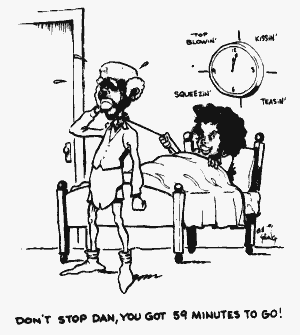
The idea of the "sixty minute man" became iconic, entering the national lexicon in other songs (for a good laugh, listen to the rockabilly and country'n'western versions by Jerry Lee Lewis and Hardrock Gunter on emusic), in movies like Bull Durham (cut to Crash and Annie thrashing around in bed) and in cartoons like this (note the wall markings around the clock).
The Dominoes were quickly "answered" in 1952 with Can't Do Sixty No More, the very first record by another early vocal group, the Du-Droppers. But just when you're about to start feeling sorry for the Du-Droppers, the lyrics makes it clear that things aren't really that bad, after all:
[The R&B Years: 1951]
[The R&B Years: 1952]
* * * * * * * * * * * *
Department of Updates
It turns out there's a website in Lebanon, of all places, that's a great source of all stuff Springsteen-related. As I wrote, I was never a big Springsteen fan until I was overwhelmed at Jazzfest. But this site posted the complete lyrics to Bruce's version of When the Saints Go Marchin' In, which was one of the most emotion-charged performances I've ever witnessed. It's not clear where the extra verses came from, but they're definitely worth checking out.
The preeminent Jazzfest blog, Blogging New Orleans, also has a long post worth reading called Bruce and Tears in City of Ruin. In fact, the whole blog is worth reading.
By coincidence, Music for Your Eyes posted a couple of Fugs videos just two days before my Village Fugs post. These are Swedish TV clips from a European tour in 1968, when the Fugs were trying to make the transition from being anti-musical underground revolutionaries to a legit acid-rock band. Somewhat hypocritical, you might think. But hey, who's perfect? For easier access, PCL Link Dump posted one of the videos on Dailymotion and You Tube. To be perfectly honest, it's not very interesting.
The Roots Canal: 60 Minutes
The Dominoes -- Sixty Minute ManThe Du-Droppers -- Can't Do Sixty No More
Sixty Minute Man was the first big crossover hit, spending 14 weeks at #1 on the R&B charts and reaching #17 on the pop charts in 1951. It was one of the major reasons why rock music scandalized 1950s America -- imagine the shock when pure, innocent white teenagers started listening to that nasty rock'n'roll (a.k.a. rhythm and blues) with lyrics like these:
There'll be 15 minutes of kissingBilly Ward created the Dominoes and built it into one of the biggest vocal groups in the R&B era. He hired singers with great gospel voices like Clyde McPhatter, but ran the group so dictatorially that they kept leaving to start their own. When McPhatter quit to form the Drifters, he was replaced by Jackie Wilson who also became a big star with the Dominoes and, later, on his own.
Then you'll holler "please don't stop"
There'll be 15 minutes of teasing
And 15 minutes of squeezing
And 15 minutes of blowing my top

The idea of the "sixty minute man" became iconic, entering the national lexicon in other songs (for a good laugh, listen to the rockabilly and country'n'western versions by Jerry Lee Lewis and Hardrock Gunter on emusic), in movies like Bull Durham (cut to Crash and Annie thrashing around in bed) and in cartoons like this (note the wall markings around the clock).
The Dominoes were quickly "answered" in 1952 with Can't Do Sixty No More, the very first record by another early vocal group, the Du-Droppers. But just when you're about to start feeling sorry for the Du-Droppers, the lyrics makes it clear that things aren't really that bad, after all:
I love you, baby, but I can't do sixty no moreThe Du-Droppers had a few more hits in the early 1950s but soon disappeared. The Dominoes kept going into the 1960s (without either McPhatter or Wilson), and even recorded their own version of Can't Do Sixty No More in 1955 (a completely different song, actually a variant of their original Sixty Minute Man). Both groups were overshadowed by the wave of teenage-oriented doo-wop groups that sprang up in the mid-50s, several founded by graduates of the Dominoes.
A short thirty minutes is all that I can afford
[The R&B Years: 1951]
[The R&B Years: 1952]
* * * * * * * * * * * *
Department of Updates
It turns out there's a website in Lebanon, of all places, that's a great source of all stuff Springsteen-related. As I wrote, I was never a big Springsteen fan until I was overwhelmed at Jazzfest. But this site posted the complete lyrics to Bruce's version of When the Saints Go Marchin' In, which was one of the most emotion-charged performances I've ever witnessed. It's not clear where the extra verses came from, but they're definitely worth checking out.
The preeminent Jazzfest blog, Blogging New Orleans, also has a long post worth reading called Bruce and Tears in City of Ruin. In fact, the whole blog is worth reading.
By coincidence, Music for Your Eyes posted a couple of Fugs videos just two days before my Village Fugs post. These are Swedish TV clips from a European tour in 1968, when the Fugs were trying to make the transition from being anti-musical underground revolutionaries to a legit acid-rock band. Somewhat hypocritical, you might think. But hey, who's perfect? For easier access, PCL Link Dump posted one of the videos on Dailymotion and You Tube. To be perfectly honest, it's not very interesting.
Friday, May 12, 2006:
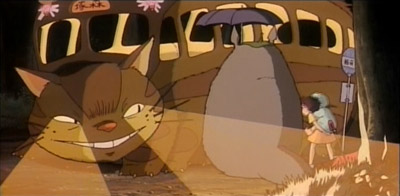
Stray Cats -- Rock This Town
The Stray Cats formed in New York in the late 1970s and had some success spearheading a rockabilly revival during the New Wave period, though their early album Built for Speed sold the best and their popularity tapered off afterwards. Their guitarist was Brian Setzer, whom you'll probably remember from the swing revival some time back; the man loves his roots music. I haven't heard most of his solo music, and I bought this LP on a lark (actually not true--I've never done anything on a lark, though I used to dine on a turkey), wondering if it could possibly be any good. And I think that it is.
[Stray Cats -- Built for Speed, or a more reasonably priced Greatest Hits comp]
...
In spite of having had plenty of time to prepare for an announced Miyazaki blogathon, my attentions were mostly elsewhere between then and now. So I'll just talk briefly about one of my favorite Miyazaki films, My Neighbor Totoro. It's a story about two girls (Mei and Satsuki) moving to a house near the forest; their father works at a university and their mother is in the hospital being treated for an unidentified illness. Like most of Miyazaki's work, it's got a fairly simple plot but takes some unexpected and wonderful turns: for instance, there are these odd black sooty creatures living in the house, which their father identifies as mak-kuro kurosuke, the spots you see when going from darkness to bright light, and which their elderly neighbor identifies as susu-atari, the creatures that live in old, empty houses and make dust.
On Satsuki's first day at school, Mei discovers an odd ghostly creature moving through the grass. She chases it through a low passage in the trees, almost a tunnel made of interleaved branches, then tumbles through a hole and meets Totoro, the king of the forest. I won't give the whole story away, but I wanted to post the following screenshots to give some idea of what it is I like about Miyazaki. I'm sure they'll explain it much better than I can--this sequence would be magic even if it weren't about a girl lending her father's umbrella to the keeper of the forest.

He has claws, yes. He takes the umbrella carefully, and Satsuki shows him how to use it.
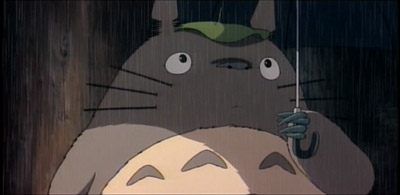
He decides he likes the sound the rain makes on the umbrella:
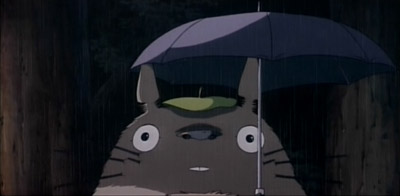

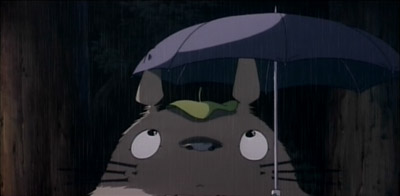
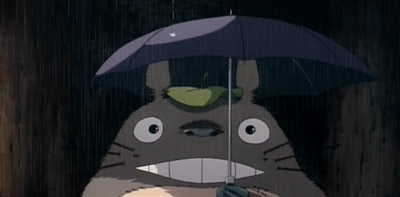
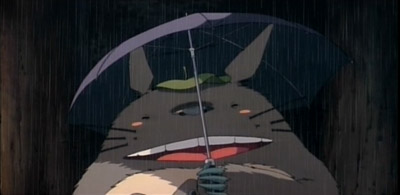
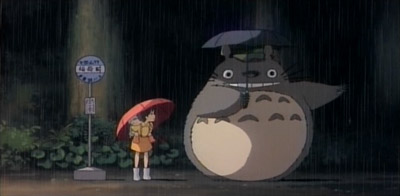

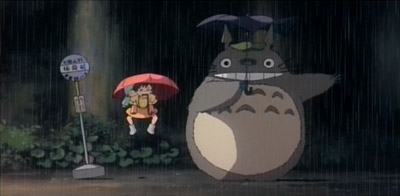

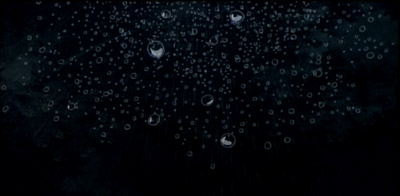
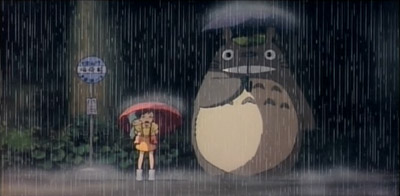
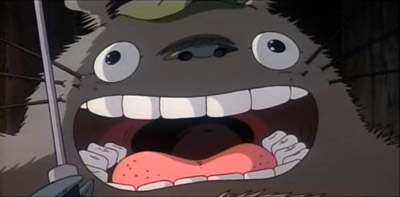
Aside from its quirkiness and its frequent mixture of menace and wide-eyed wonder, Miyazaki's work also shows a loving attention to detail. For instance, in My Neighbor Totoro there are the mice lights on the cat bus (the running lights at top), the dragonflies landing on garden posts, the discarded bottle at the bottom of a stream, the snail crawling up a plant's stalk, and the irises and lilies scattered in the landscape even in brief shots where the attention is directed elsewhere.
It's fun and fascinating work--even his earliest work in television has been worthwhile--and I'm happy that his films are widely available and in their original formats.
[Site dedicated to Hayao Miyazaki's work]
[Interview with Hayao Miyazaki: "It's not me who makes the film. The film makes itself and I have no choice but to follow."]
[Roger Ebert's writeup on Miyazaki and My Neighbor Totoro]
update: Quiet Bubble has writeups for Miyazaki's most recent three films, Princess Mononoke, Spirited Away, and Howl's Moving Castle. The first two are perceptive, but I can't speak to the third--I haven't yet seen the movie so I didn't read it. ^_^
Also see: Noel Vera on Howl's Moving Castle, cinemarati on On Your Mark, and CultureSpace on Spirited Away.
New at Quiet Bubble: writeups on Porco Rosso, Kiki's Delivery Service, Nausicaa, Lapute, and My Neighbor Totoro.
I'll be posting additional links to other posts in the Miyazaki-thon (Miyazaki-san-athon?) as I find them.
...
In other news, I'd like to recommend new mp3blog MadPriest-UK. First post: awesome soul mix. Second: Latin tracks. It's a good start.
Stray Cats and the cat bus

Stray Cats -- Rock This Town
The Stray Cats formed in New York in the late 1970s and had some success spearheading a rockabilly revival during the New Wave period, though their early album Built for Speed sold the best and their popularity tapered off afterwards. Their guitarist was Brian Setzer, whom you'll probably remember from the swing revival some time back; the man loves his roots music. I haven't heard most of his solo music, and I bought this LP on a lark (actually not true--I've never done anything on a lark, though I used to dine on a turkey), wondering if it could possibly be any good. And I think that it is.
[Stray Cats -- Built for Speed, or a more reasonably priced Greatest Hits comp]
...
In spite of having had plenty of time to prepare for an announced Miyazaki blogathon, my attentions were mostly elsewhere between then and now. So I'll just talk briefly about one of my favorite Miyazaki films, My Neighbor Totoro. It's a story about two girls (Mei and Satsuki) moving to a house near the forest; their father works at a university and their mother is in the hospital being treated for an unidentified illness. Like most of Miyazaki's work, it's got a fairly simple plot but takes some unexpected and wonderful turns: for instance, there are these odd black sooty creatures living in the house, which their father identifies as mak-kuro kurosuke, the spots you see when going from darkness to bright light, and which their elderly neighbor identifies as susu-atari, the creatures that live in old, empty houses and make dust.
On Satsuki's first day at school, Mei discovers an odd ghostly creature moving through the grass. She chases it through a low passage in the trees, almost a tunnel made of interleaved branches, then tumbles through a hole and meets Totoro, the king of the forest. I won't give the whole story away, but I wanted to post the following screenshots to give some idea of what it is I like about Miyazaki. I'm sure they'll explain it much better than I can--this sequence would be magic even if it weren't about a girl lending her father's umbrella to the keeper of the forest.

He has claws, yes. He takes the umbrella carefully, and Satsuki shows him how to use it.

He decides he likes the sound the rain makes on the umbrella:












Aside from its quirkiness and its frequent mixture of menace and wide-eyed wonder, Miyazaki's work also shows a loving attention to detail. For instance, in My Neighbor Totoro there are the mice lights on the cat bus (the running lights at top), the dragonflies landing on garden posts, the discarded bottle at the bottom of a stream, the snail crawling up a plant's stalk, and the irises and lilies scattered in the landscape even in brief shots where the attention is directed elsewhere.
It's fun and fascinating work--even his earliest work in television has been worthwhile--and I'm happy that his films are widely available and in their original formats.
[Site dedicated to Hayao Miyazaki's work]
[Interview with Hayao Miyazaki: "It's not me who makes the film. The film makes itself and I have no choice but to follow."]
[Roger Ebert's writeup on Miyazaki and My Neighbor Totoro]
update: Quiet Bubble has writeups for Miyazaki's most recent three films, Princess Mononoke, Spirited Away, and Howl's Moving Castle. The first two are perceptive, but I can't speak to the third--I haven't yet seen the movie so I didn't read it. ^_^
Also see: Noel Vera on Howl's Moving Castle, cinemarati on On Your Mark, and CultureSpace on Spirited Away.
New at Quiet Bubble: writeups on Porco Rosso, Kiki's Delivery Service, Nausicaa, Lapute, and My Neighbor Totoro.
I'll be posting additional links to other posts in the Miyazaki-thon (Miyazaki-san-athon?) as I find them.
...
In other news, I'd like to recommend new mp3blog MadPriest-UK. First post: awesome soul mix. Second: Latin tracks. It's a good start.
Thursday, May 11, 2006:
As long as we're hanging out in the streets of Greenwich Village (see David Blue, below), let's not forget the legendary Village Fugs (they dropped the "village" after their first record). They were usually described as folk-rock but that doesn't quite fit their surreal beatnik garage music. Actually, to call them a garage band compliments their musical skill. They prided themselves at not being musicians. They were right. But they had other charms, largely their ability to outrage.
At the heart of the band were a couple of proto-Hippies named Tuli Kupferberg and Ed Sanders. Kupferberg was a beat poet; Sanders published a magazine called Fuck You/a magazine of the arts. They wrote songs like Kill for Peace, Do You Like Boobs a Lot, Dirty Old Man and Group Grope. They named the band after the euphemism for "fuck" that's pretty much every other word in Norman Mailer's The Naked and the Dead. (Dorothy Parker is said to have introduced herself to Mailer by saying, "So you're the man who can't spell fuck.") At the time, it was pretty far out there. Of course, this band would be pretty far out there at any time. The only song of theirs that actually approached anything mainstream was Morning, Morning, which became a popular Richie Havens song.
This being Greenwich Village at a seminal period, the Fugs have been chronicled pretty exhaustively. Their website has a first-person history of the band. You can read interviews here and here.
I think this song captures the craziness of the times as well as anything. I digitized this from a scratchy old vinyl, but most of their stuff has been released on CDs. Believe me, it doesn't make much of a difference.
[The Fugs' First Album]
The Roots Canal: The Fugs
The Village Fugs -- I Couldn't Get HighAs long as we're hanging out in the streets of Greenwich Village (see David Blue, below), let's not forget the legendary Village Fugs (they dropped the "village" after their first record). They were usually described as folk-rock but that doesn't quite fit their surreal beatnik garage music. Actually, to call them a garage band compliments their musical skill. They prided themselves at not being musicians. They were right. But they had other charms, largely their ability to outrage.
At the heart of the band were a couple of proto-Hippies named Tuli Kupferberg and Ed Sanders. Kupferberg was a beat poet; Sanders published a magazine called Fuck You/a magazine of the arts. They wrote songs like Kill for Peace, Do You Like Boobs a Lot, Dirty Old Man and Group Grope. They named the band after the euphemism for "fuck" that's pretty much every other word in Norman Mailer's The Naked and the Dead. (Dorothy Parker is said to have introduced herself to Mailer by saying, "So you're the man who can't spell fuck.") At the time, it was pretty far out there. Of course, this band would be pretty far out there at any time. The only song of theirs that actually approached anything mainstream was Morning, Morning, which became a popular Richie Havens song.
This being Greenwich Village at a seminal period, the Fugs have been chronicled pretty exhaustively. Their website has a first-person history of the band. You can read interviews here and here.
I think this song captures the craziness of the times as well as anything. I digitized this from a scratchy old vinyl, but most of their stuff has been released on CDs. Believe me, it doesn't make much of a difference.
[The Fugs' First Album]
Tuesday, May 09, 2006:
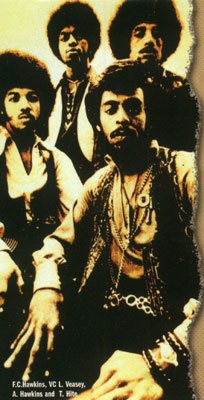
Black Merda -- The Folks from Mother's Mixer
Black Merda are the self-proclaimed "first black rock group," a psychedelic funk-rock outfit out of Detroit who recorded two albums (in 1967 and in 1971) which for various reasons fell off the map. Musically, they're a bit like Hendrix crossed with Funkadelic, with dips into Curtis Mayfield, The Stylistics, and acoustic blues.
Their first album was on Chess, at a time when the label was being sold to GRT Corp and Marshall Chess had flown to the U.K. to work with the Rolling Stones. It's a safe bet the first album didn't get the attention it deserved, and the liner notes say that the second album didn't either. Black Merda have been getting plenty of respect lately, though, with the Beastie Boys, Mojo Magazine, and Rolling Stone all singing their praises.
The band were originally VC L. Veasey on bass and acoustic guitar, Charles Hawkins on guitar, Anthony Hawkins on guitar, and Tyrone Hite on drums, with the band sharing vocals. Hite left the band after the first album and was replaced with Bob Crowder.
Their first two albums have been re-released on one comp; I started out picking favorites but it ended up being half the album so I'll skip all that.
And no, Merda here is not what you might be thinking if you speak Italian, Spanish, or French--it's pronounced like "Murder." The group's name was a pointed comment about the political climate at the time; they thought "Murder, Incorporated" sounded too gangster, then they decided to change the spelling from "Black Murder" to make it less negative.
Veasey and the Hawkins brothers are still together, welcoming the renewed press attention, and hoping to tour as a result. Awesome.
[The Folks from Mother's Mixer ]
[Official site]
[Good lengthy writeup at the Detroit Metro Times]
Black Merda -- The Folks from Mother's Mixer

Black Merda -- The Folks from Mother's Mixer
Black Merda are the self-proclaimed "first black rock group," a psychedelic funk-rock outfit out of Detroit who recorded two albums (in 1967 and in 1971) which for various reasons fell off the map. Musically, they're a bit like Hendrix crossed with Funkadelic, with dips into Curtis Mayfield, The Stylistics, and acoustic blues.
Their first album was on Chess, at a time when the label was being sold to GRT Corp and Marshall Chess had flown to the U.K. to work with the Rolling Stones. It's a safe bet the first album didn't get the attention it deserved, and the liner notes say that the second album didn't either. Black Merda have been getting plenty of respect lately, though, with the Beastie Boys, Mojo Magazine, and Rolling Stone all singing their praises.
The band were originally VC L. Veasey on bass and acoustic guitar, Charles Hawkins on guitar, Anthony Hawkins on guitar, and Tyrone Hite on drums, with the band sharing vocals. Hite left the band after the first album and was replaced with Bob Crowder.
Their first two albums have been re-released on one comp; I started out picking favorites but it ended up being half the album so I'll skip all that.
And no, Merda here is not what you might be thinking if you speak Italian, Spanish, or French--it's pronounced like "Murder." The group's name was a pointed comment about the political climate at the time; they thought "Murder, Incorporated" sounded too gangster, then they decided to change the spelling from "Black Murder" to make it less negative.
Veasey and the Hawkins brothers are still together, welcoming the renewed press attention, and hoping to tour as a result. Awesome.
[The Folks from Mother's Mixer ]
[Official site]
[Good lengthy writeup at the Detroit Metro Times]
Labels: rock
Saturday, May 06, 2006:
David Blue was part of the folk set running around Greenwich Village in the 60s. He, Phil Ochs and Bob Dylan were particularly close friends -- in fact, some speculate that It's All Over Now, Baby Blue was written about him. That's him sitting on the floor behind Dylan on the cover of The Basement Tapes. He had a prominent role in Dylan's film, Renaldo and Clara. Later, Dylan was said to treat him badly, more like an errand boy than a friend. There's also speculation that Joni Mitchell's song and album Blue were named after him.
 David was kind of a sad case. All of his friends went on to become famous, and he was left behind. He was apparently finally reaching some kind of peace with himself when he died of a heart attack while jogging in Washington Square Park in 1982. He recorded several albums under a variety of names: Dave Cohen, David Blue, S. David Cohen (his birth name). According to a memoir by his wife, he actually got the name David Blue from Eric Anderson, and when he tried it out on Dylan, Bob laughed and started singing "It's all over now, David Blue" (which would indicate that the song wasn't written about him, after all).
David was kind of a sad case. All of his friends went on to become famous, and he was left behind. He was apparently finally reaching some kind of peace with himself when he died of a heart attack while jogging in Washington Square Park in 1982. He recorded several albums under a variety of names: Dave Cohen, David Blue, S. David Cohen (his birth name). According to a memoir by his wife, he actually got the name David Blue from Eric Anderson, and when he tried it out on Dylan, Bob laughed and started singing "It's all over now, David Blue" (which would indicate that the song wasn't written about him, after all).
This was his signature song. I remember hearing him perform it in the coffeehouses on Bleecker Street. It was later recorded by Jerry Jeff Walker and David Bromberg (who changed one word, from "my shoes shined" to "my sneakers shined"), among others. This version is from a classic folk compilation album called Singer Songwriter Project, which included songs by Dave Cohen, Patrick Sky, Bruce Murdoch and Richard Farina (better known for writing Been Down So Long It Looks Like Up to Me and forming a folk duo with his second wife, Joan Baez' sister Mimi). Long out of print, it was recently rereleased in England together with Blue's first solo album.
[Singer Songwriter Project/David Blue]
The Roots Canal: David Blue
Dave Cohen (David Blue) -- I Like to Sleep Late in the MorningDavid Blue was part of the folk set running around Greenwich Village in the 60s. He, Phil Ochs and Bob Dylan were particularly close friends -- in fact, some speculate that It's All Over Now, Baby Blue was written about him. That's him sitting on the floor behind Dylan on the cover of The Basement Tapes. He had a prominent role in Dylan's film, Renaldo and Clara. Later, Dylan was said to treat him badly, more like an errand boy than a friend. There's also speculation that Joni Mitchell's song and album Blue were named after him.
 David was kind of a sad case. All of his friends went on to become famous, and he was left behind. He was apparently finally reaching some kind of peace with himself when he died of a heart attack while jogging in Washington Square Park in 1982. He recorded several albums under a variety of names: Dave Cohen, David Blue, S. David Cohen (his birth name). According to a memoir by his wife, he actually got the name David Blue from Eric Anderson, and when he tried it out on Dylan, Bob laughed and started singing "It's all over now, David Blue" (which would indicate that the song wasn't written about him, after all).
David was kind of a sad case. All of his friends went on to become famous, and he was left behind. He was apparently finally reaching some kind of peace with himself when he died of a heart attack while jogging in Washington Square Park in 1982. He recorded several albums under a variety of names: Dave Cohen, David Blue, S. David Cohen (his birth name). According to a memoir by his wife, he actually got the name David Blue from Eric Anderson, and when he tried it out on Dylan, Bob laughed and started singing "It's all over now, David Blue" (which would indicate that the song wasn't written about him, after all).This was his signature song. I remember hearing him perform it in the coffeehouses on Bleecker Street. It was later recorded by Jerry Jeff Walker and David Bromberg (who changed one word, from "my shoes shined" to "my sneakers shined"), among others. This version is from a classic folk compilation album called Singer Songwriter Project, which included songs by Dave Cohen, Patrick Sky, Bruce Murdoch and Richard Farina (better known for writing Been Down So Long It Looks Like Up to Me and forming a folk duo with his second wife, Joan Baez' sister Mimi). Long out of print, it was recently rereleased in England together with Blue's first solo album.
[Singer Songwriter Project/David Blue]
Thursday, May 04, 2006:
This track is from Mr. Dixon's Workshop, a collection of Willie Dixon tunes performed by bluesmen like Magic Sam, Junior Wells, and Otis Rush--tunes with gritty lyrics and typically fiery deliveries. Then there's this track from a young Betty Everett, a sweet bit of bubblegum R&B that puts me in mind of Seamus Heaney (of all people). In one of Heaney's books, in among the meaty intellectual poems, there's a page with nothing more than a haiku about walking with a cane on ice. It's striking in its simplicity, and oddly affecting.
Betty Everett might be best known for her song "You're No Good," which Linda Ronstadt made famous, or maybe "The Shoop Shoop Song (It's in His Kiss)." She's been featured on Soul Shower and also featured on Number One Songs in Heaven, for good reason.
[Mr. Dixon's Workshop at amazon.com]
[and also at emusic]
[Willie Dixon bio @ allmusic.com]
Betty Everett -- My Love
Betty Everett -- My LoveThis track is from Mr. Dixon's Workshop, a collection of Willie Dixon tunes performed by bluesmen like Magic Sam, Junior Wells, and Otis Rush--tunes with gritty lyrics and typically fiery deliveries. Then there's this track from a young Betty Everett, a sweet bit of bubblegum R&B that puts me in mind of Seamus Heaney (of all people). In one of Heaney's books, in among the meaty intellectual poems, there's a page with nothing more than a haiku about walking with a cane on ice. It's striking in its simplicity, and oddly affecting.
Betty Everett might be best known for her song "You're No Good," which Linda Ronstadt made famous, or maybe "The Shoop Shoop Song (It's in His Kiss)." She's been featured on Soul Shower and also featured on Number One Songs in Heaven, for good reason.
[Mr. Dixon's Workshop at amazon.com]
[and also at emusic]
[Willie Dixon bio @ allmusic.com]
Labels: RnB
Tuesday, May 02, 2006:
Culture are Joseph Hill, Albert Walker, and Kenneth Dayes, Rastafarians particularly good at wrapping fiery political lyrics in beautiful head-bobbing melodies. Their work is just as simple as it is catchy and enjoyable, at least provided you're not a baldhead or a reactionary feeling threatened by the lyrics.
For example: politics: "Pirate Days" is a very cheerful-sounding song about colonialism and slavery. What it is is pointed and outraged and--here's the genius of it--lovely. It takes a special skill to pull that off.
Culture started in the late 1970s, with Two Sevens Clash, a roots reggae classic, a giant in the field, and they're still going strong.
[website about Culture]
[Allmusic bio]
[Two Sevens Clash review]
[Two Sevens Clash]
men of Culture: Pirate Days
Culture -- Pirate DaysCulture are Joseph Hill, Albert Walker, and Kenneth Dayes, Rastafarians particularly good at wrapping fiery political lyrics in beautiful head-bobbing melodies. Their work is just as simple as it is catchy and enjoyable, at least provided you're not a baldhead or a reactionary feeling threatened by the lyrics.
For example: politics: "Pirate Days" is a very cheerful-sounding song about colonialism and slavery. What it is is pointed and outraged and--here's the genius of it--lovely. It takes a special skill to pull that off.
Culture started in the late 1970s, with Two Sevens Clash, a roots reggae classic, a giant in the field, and they're still going strong.
[website about Culture]
[Allmusic bio]
[Two Sevens Clash review]
[Two Sevens Clash]
Labels: reggae
Monday, May 01, 2006:

Where do I begin? There was great music all weekend, but the musical temperature kept rising higher and higher to the very end. If I tried to give a sense of what an ecstatic musical experience it was, I'd sound like a babbling 16-year-old so I'll just try to share some impressions of what I heard and saw. That's Eddie Bo with his band on the right, dancing around with a parasol at the end of his set.
Here's the top highlight, with others (and several MP3s) on the permalink:
Bruce Springsteen & The Seeger Sessions Band
The Boss? 'Nuff said. I was never a huge Springsteen fan, but now I'm a convert. He closed the first weekend with an emotional suckerpunch that left a huge crowd reeling.
Springsteen was inventing a new kind of music. Folk music as no one ever imagined it. He took century-old songs and made them musically and culturally relevant for today. I never before appreciated the emotional content Springsteen's voice can deliver. The combination of Bruce's passion with an emotion-laden setting and a huge, rollickin' band (I counted 19 musicians on stage: 6 horns, 2 fiddles, banjo, accordion, stand-up bass, 3 backup vocalists, and 2 guitars and a pedal steel guitar besides the Boss) created a situation that touched the heart of even the most jaded old music fan.
Bruce started the set by announcing that "This is our first gig. Let's hope it goes well," and then they played this song:
Bruce Springsteen -- Oh Mary Don't You Weep
At the end of the main set, the band played a 40's jump blues called Voo-It, Voo-It, originally recorded by Marion Abernathy (under the name "The Blues Woman"), popularized by Helen Humes and most recently covered 15 years ago by Paula Lockheart. I've been playing blues detective for "voot" songs for some time, and plan a major post on the subject. [Note to self: Now that New Orleans Month is ended on The Roots Canal, it's time to get moving!]
There were 4 encores: My City of Ruins, originally written about Asbury Park, NJ, but with obvious relevance for New Orleans; a joyous Darktown Strutters Ball; a rendition of You Can Look (But You Better Not Touch) that left me speechless; and, finally, a reimagining of When the Saints Go Marchin' In as a soulful protest song that was not only unrecognizable but included some rarely heard lyrics (at least, by me):
Click on the permalink for Elvis Costello, Keb Mo, Walter "Wolfman" Washington, The Iguanas and others, including a few MP3's. (Did I mention Bob Dylan?)
The Roots Canal: Jazzfest (wow)

Where do I begin? There was great music all weekend, but the musical temperature kept rising higher and higher to the very end. If I tried to give a sense of what an ecstatic musical experience it was, I'd sound like a babbling 16-year-old so I'll just try to share some impressions of what I heard and saw. That's Eddie Bo with his band on the right, dancing around with a parasol at the end of his set.
Here's the top highlight, with others (and several MP3s) on the permalink:
Bruce Springsteen & The Seeger Sessions Band
The Boss? 'Nuff said. I was never a huge Springsteen fan, but now I'm a convert. He closed the first weekend with an emotional suckerpunch that left a huge crowd reeling.
Springsteen was inventing a new kind of music. Folk music as no one ever imagined it. He took century-old songs and made them musically and culturally relevant for today. I never before appreciated the emotional content Springsteen's voice can deliver. The combination of Bruce's passion with an emotion-laden setting and a huge, rollickin' band (I counted 19 musicians on stage: 6 horns, 2 fiddles, banjo, accordion, stand-up bass, 3 backup vocalists, and 2 guitars and a pedal steel guitar besides the Boss) created a situation that touched the heart of even the most jaded old music fan.
Bruce started the set by announcing that "This is our first gig. Let's hope it goes well," and then they played this song:
Bruce Springsteen -- Oh Mary Don't You Weep
At the end of the main set, the band played a 40's jump blues called Voo-It, Voo-It, originally recorded by Marion Abernathy (under the name "The Blues Woman"), popularized by Helen Humes and most recently covered 15 years ago by Paula Lockheart. I've been playing blues detective for "voot" songs for some time, and plan a major post on the subject. [Note to self: Now that New Orleans Month is ended on The Roots Canal, it's time to get moving!]
There were 4 encores: My City of Ruins, originally written about Asbury Park, NJ, but with obvious relevance for New Orleans; a joyous Darktown Strutters Ball; a rendition of You Can Look (But You Better Not Touch) that left me speechless; and, finally, a reimagining of When the Saints Go Marchin' In as a soulful protest song that was not only unrecognizable but included some rarely heard lyrics (at least, by me):
Now some say this world of troubleThe grizzled New Orleans native next to me touched a handkerchief to his eye.
Is the only world we'll see.
But I'm waiting for that moment
When the new world is revealed.
Click on the permalink for Elvis Costello, Keb Mo, Walter "Wolfman" Washington, The Iguanas and others, including a few MP3's. (Did I mention Bob Dylan?)
* * * * * * * *
Allen Toussaint with Elvis Costello
This was my weekend's high point -- for about half an hour, until Springsteen blew me away. Allen Toussaint is a living New Orleans legend who teamed with Elvis for most of the set. They played half a dozen songs from their new album, The River in Reverse, which will be released in June. When the time comes, run right out and get it. It's that good.
After hearing lots of great New Orleans grooves all weekend, it was refreshing to hear someone use the music as a starting point for something more ambitious. This is serious music – Elvis Costello songwriting backed by a great piano stylist and funky New Orleans rhythm section. The album’s title song is sure to get plenty of airplay, as the refrain of "Wake up! Wake up!" builds to a big finale. Toussaint’s piano licks on Tears, Tears and More Tears (I’m only guessing at the title) were a great counterpoint to Elvis’ lament.
After Elvis left the stage, Toussaint sang his contribution from Our New Orleans:
Allen Toussaint – Yes We Can Can
[Our New Orleans: A Benefit Album for the Gulf Coast]
* * * * * * * * * *
Keb Mo
Amidst all the hard-driving rhythm-and-blues grooves at Jazzfest, it was great to see Keb Mo in total command of a big audience on the main stage with an all-acoustic set. Just him and one backup musician, Clayton Gibbs. Keb played acoustic and steel guitar and harmonica. Gibbs played guitar, banjo and mandolin. Most of the set was from Keb’s great early albums. Of 13 songs, 9 were from the first three albums (my favorites) and only 4 from the later, less successful albums. The highlights, for me, weren't necessarily my favorite songs from the records but the combination of steel slide guitar and banjo on That’s Not Love along with Henry and Everything I Need.
* * * * * * * * *
Walter "Wolfman" Washington
I’m a fan of the Wolfman, and he didn't disappoint. Washington puts the rhythm back in rhythm-and-blues. He used to play guitar for the late great New Orleans blues-and-jazz singer Johnny Adams (a future post!) and apparently learned to sing by watching the master. He wasn't born with a great voice, but makes up for it with enthusiasm -- and an occasional howl. His gravelly voice easily goes back and forth between blues, soul and even light jazz. His bass player had the best bass solo I saw all weekend. Here's an instrumental with his trademark howl:
Walter *Wolfman* Washington – On the Prowl
[On the Prowl]
* * * * * * * *
Eddie Bo
What a great performer! He's lost nothing over the years. Great funk band. When Eddie sang Drown in My Own Tears, it was the only time I've ever heard anyone sing Ray Charles without being a pale imitation of the master. When he played Professor Longhair, he was channeling the Professor himself. He only got to play a few songs, but he lit the stage on fire. When they told him he had to end his set, he picked up a parasol and started dancing around the stage. I'd like to post an Eddie Bo song, but he didn't bring any of his albums to sell at the Fairgrounds' record store. I guess that's typical business practice for Eddie, who's not doing too well since Katrina.
* * * * * * * *
The Iguanas
My toughest decision was whether to see the subdudes, Luther Kent or the Iguanas. I chose to skip the 'dudes, because they were at the main stage which is the worst venue at the Fairgrounds unless you stake out a spot early (as we did the first and third days). Instead, I caught Luther Kent's first few songs (he started a little earlier than the others) and then moved over to the Iguanas at the next stage. Good choice. Luther and Trick Bag always put on a great show with their big-band style of blues, but the Iguanas are an unusual, idiosyncratic band. The highlight was a folky number with a kind of squeaky atonal horn-and-guitar-and-percussion intro (it's a little different on the record). It's on the album I already owned but I had never really focused on this song. There's a lesson there, I think.
The Iguanas – The First Kiss Is Free
[Plastic Silver 9 Volt Heart]
* * * * * * * *
Here are some names I wasn't familiar with:
J. Monque 'D Blues Band – Whiz Bang
J. Monque 'D barely seems to break a sweat as he blends New Orleans grooves with a healthy dose of Chicago-style blues and Louisiana "swamp blues" (according to the liner notes). Here's a novelty song that kept the crowd laughing all the way.
[Chitlin' Eatin' Music] Also available on emusic.
Elements – The Brightness
Here's a reggae-rock band from Baton Rouge, of all places. They mix lots of influences into a big, big sound.
[The Brightness]
Anders Osborne – Break the Chain
This young white Swedish-born New Orleans bluesman has a bright style that sometimes seems to verge on pop but stays credible. I like this title song even though it's nothing like the other songs on the album, which tend to be a more hard-rock style of blues.
[Break the Chain]
* * * * * * * *
Oh, yes. Bob Dylan. How can you separate memory from experience when you listen to Dylan live? He put on a good show, I guess. It's like watching a guy named Bob play Dylan songs. Is it real, or is it Memorex? I'll take the Memorex over the real.
Allen Toussaint with Elvis Costello
This was my weekend's high point -- for about half an hour, until Springsteen blew me away. Allen Toussaint is a living New Orleans legend who teamed with Elvis for most of the set. They played half a dozen songs from their new album, The River in Reverse, which will be released in June. When the time comes, run right out and get it. It's that good.
After hearing lots of great New Orleans grooves all weekend, it was refreshing to hear someone use the music as a starting point for something more ambitious. This is serious music – Elvis Costello songwriting backed by a great piano stylist and funky New Orleans rhythm section. The album’s title song is sure to get plenty of airplay, as the refrain of "Wake up! Wake up!" builds to a big finale. Toussaint’s piano licks on Tears, Tears and More Tears (I’m only guessing at the title) were a great counterpoint to Elvis’ lament.
After Elvis left the stage, Toussaint sang his contribution from Our New Orleans:
Allen Toussaint – Yes We Can Can
[Our New Orleans: A Benefit Album for the Gulf Coast]
* * * * * * * * * *
Keb Mo
Amidst all the hard-driving rhythm-and-blues grooves at Jazzfest, it was great to see Keb Mo in total command of a big audience on the main stage with an all-acoustic set. Just him and one backup musician, Clayton Gibbs. Keb played acoustic and steel guitar and harmonica. Gibbs played guitar, banjo and mandolin. Most of the set was from Keb’s great early albums. Of 13 songs, 9 were from the first three albums (my favorites) and only 4 from the later, less successful albums. The highlights, for me, weren't necessarily my favorite songs from the records but the combination of steel slide guitar and banjo on That’s Not Love along with Henry and Everything I Need.
* * * * * * * * *
Walter "Wolfman" Washington
I’m a fan of the Wolfman, and he didn't disappoint. Washington puts the rhythm back in rhythm-and-blues. He used to play guitar for the late great New Orleans blues-and-jazz singer Johnny Adams (a future post!) and apparently learned to sing by watching the master. He wasn't born with a great voice, but makes up for it with enthusiasm -- and an occasional howl. His gravelly voice easily goes back and forth between blues, soul and even light jazz. His bass player had the best bass solo I saw all weekend. Here's an instrumental with his trademark howl:
Walter *Wolfman* Washington – On the Prowl
[On the Prowl]
* * * * * * * *
Eddie Bo
What a great performer! He's lost nothing over the years. Great funk band. When Eddie sang Drown in My Own Tears, it was the only time I've ever heard anyone sing Ray Charles without being a pale imitation of the master. When he played Professor Longhair, he was channeling the Professor himself. He only got to play a few songs, but he lit the stage on fire. When they told him he had to end his set, he picked up a parasol and started dancing around the stage. I'd like to post an Eddie Bo song, but he didn't bring any of his albums to sell at the Fairgrounds' record store. I guess that's typical business practice for Eddie, who's not doing too well since Katrina.
* * * * * * * *
The Iguanas
My toughest decision was whether to see the subdudes, Luther Kent or the Iguanas. I chose to skip the 'dudes, because they were at the main stage which is the worst venue at the Fairgrounds unless you stake out a spot early (as we did the first and third days). Instead, I caught Luther Kent's first few songs (he started a little earlier than the others) and then moved over to the Iguanas at the next stage. Good choice. Luther and Trick Bag always put on a great show with their big-band style of blues, but the Iguanas are an unusual, idiosyncratic band. The highlight was a folky number with a kind of squeaky atonal horn-and-guitar-and-percussion intro (it's a little different on the record). It's on the album I already owned but I had never really focused on this song. There's a lesson there, I think.
The Iguanas – The First Kiss Is Free
[Plastic Silver 9 Volt Heart]
* * * * * * * *
Here are some names I wasn't familiar with:
J. Monque 'D Blues Band – Whiz Bang
J. Monque 'D barely seems to break a sweat as he blends New Orleans grooves with a healthy dose of Chicago-style blues and Louisiana "swamp blues" (according to the liner notes). Here's a novelty song that kept the crowd laughing all the way.
[Chitlin' Eatin' Music] Also available on emusic.
Elements – The Brightness
Here's a reggae-rock band from Baton Rouge, of all places. They mix lots of influences into a big, big sound.
[The Brightness]
Anders Osborne – Break the Chain
This young white Swedish-born New Orleans bluesman has a bright style that sometimes seems to verge on pop but stays credible. I like this title song even though it's nothing like the other songs on the album, which tend to be a more hard-rock style of blues.
[Break the Chain]
* * * * * * * *
Oh, yes. Bob Dylan. How can you separate memory from experience when you listen to Dylan live? He put on a good show, I guess. It's like watching a guy named Bob play Dylan songs. Is it real, or is it Memorex? I'll take the Memorex over the real.
